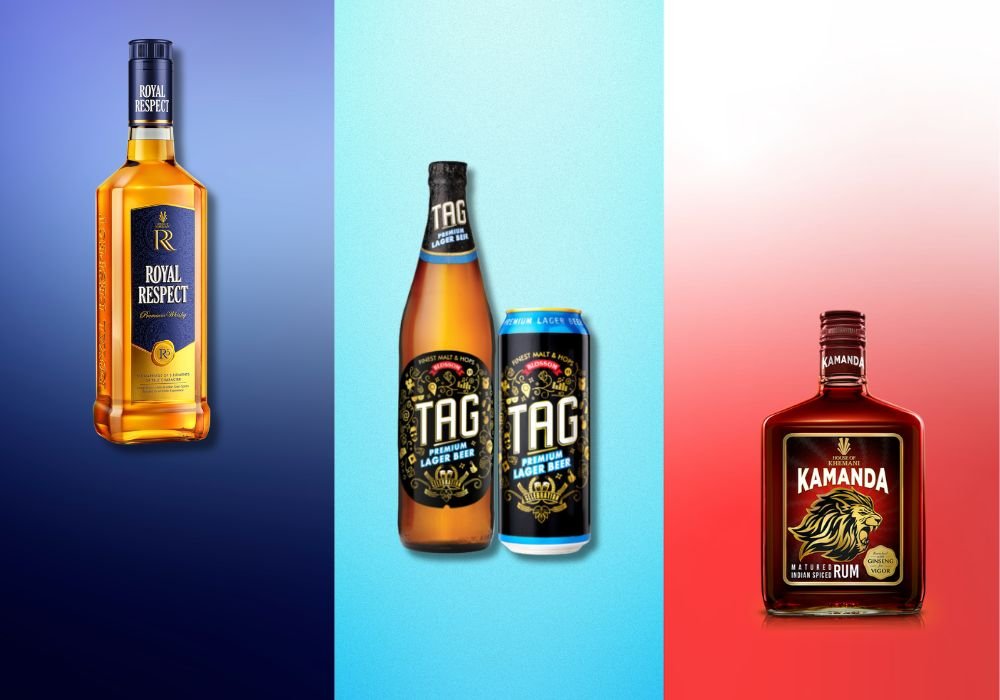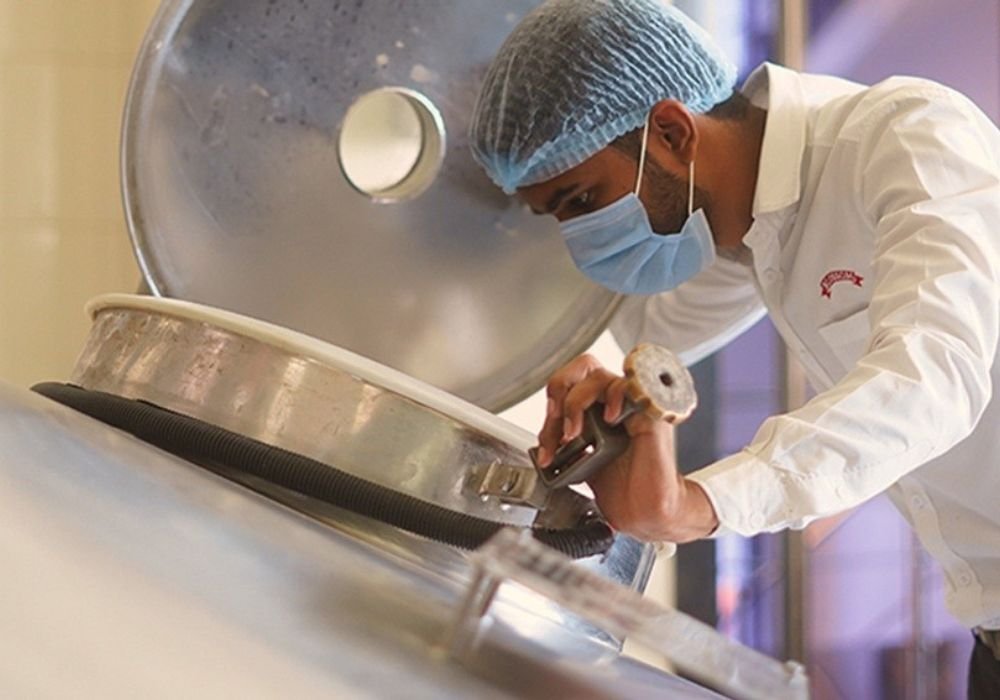“Effective Brand-Building & Marketing are Crucial,” Says Amit Khemani, Managing Director at Blossom Industries

Mr Amit Khemani, Managing Director at Blossom Industries, comes with more than 20 years of experience in the beverage industry. He is an acclaimed successful entrepreneur in the business of alcoholic beverages in India and the driving force behind Blossom Industries’ successful expansion into over 15 countries. He underwent extensive training encompassing all aspects of operations and management at Diageo PLC in Scotland, covering both the distillery plant and corporate office. Following the completion of his formal education and experiences in the distillery plant, he joined the Khemani Group, a family business, in 2001.
The Khemani Group, a prominent player in the Indian spirit industry, initiated its journey in 1983 with Royal Distillery Private Limited in Daman, introducing the “Royal Special” whisky brand. This company specializes in producing high-quality blended whiskies, incorporating the finest Malt Spirit, Grain Spirit, and Scotch to maintain a world-class standard of consistent quality. Additionally, the group acquired Blossom Industries Ltd, a previously ailing brewery unit.
Mr Amit Khemani is currently the Group Vice Chairman at Khemani Group & the Managing Director at Blossom Industries. He offers valuable insights into the intricacies of navigating international markets within the brewing industry and shares his perspective on the global craft beer movement in the below interaction.
You’ve had an impressive career spanning over two decades in the distillery, brewery, and perfumery industries. Can you share some key insights into how the brewing industry has evolved during this time, and what trends or changes you’ve observed?
Over the past two decades, I’ve witnessed a remarkable transformation in the brewing industry, characterized by various influential trends. Foremost among these is the “Craft Beer Revolution,” which has seen exponential growth in craft breweries worldwide. These breweries, celebrated for their unique, locally crafted beers, have kindled a fresh passion among consumers for the diversity and artistry in beer production.
A fascinating shift has been the “Diversity of Styles.” While traditional beer types like lagers and ales maintain their popularity, brewers have embarked on a journey of innovation, experimenting with a myriad of flavours and ingredients. This experimentation has introduced us to sour beers, barrel-aged brews, and an exploration of experimental hop varieties, expanding the industry’s offerings significantly.
Quality has become paramount, with consumers now demanding exceptional taste, consistency, and freshness in their beer. This has driven investments in state-of-the-art equipment and stringent quality control processes, pushing industry standards to new heights.
“Sustainability” has evolved from a buzzword to a core value embraced by many breweries. Efforts to reduce water consumption, implement recycling, and source locally reflect the industry’s commitment to environmental responsibility.
The infusion of “Technology and Automation” has brought transformative change, enhancing brewing efficiency, reducing waste, and ensuring consistent product quality.
Globalization has opened new horizons, fostering collaboration among breweries worldwide, popularizing global beer styles, and offering platforms for experimenting with diverse flavours from around the world.
At the same time, Health and wellness trends have given rise to a “Low-Alcohol and Non-Alcoholic” beer boom, responding to the preferences of health-conscious consumers.
Moreover, consumer education has thrived alongside the craft beer movement. Consumers have transformed into connoisseurs, gaining in-depth knowledge about beer styles, brewing techniques, and ingredients. This change has prompted breweries to engage with consumers through educational initiatives, tastings, and immersive brewery tours.
Lastly, “Regulatory Changes” have left their mark on the industry, altering how breweries operate, distribute, and market their products. Adapting to these evolving regulations has become an integral part of the industry’s journey.
As the Managing Director of Blossom Industries Ltd, you’ve played a pivotal role in its success. Can you tell us about some of the specific challenges you’ve faced in the brewing sector and how you’ve overcome them?
Over the years, Blossom Industries has faced several challenges in the competitive brewing industry. Our resilience and strategic approach have been instrumental in overcoming these obstacles.
Market competition is a major challenge, and to address it, we focus on innovation and flexibility in our production to adapt to changing consumer preferences. Changing consumer preferences are monitored closely, allowing us to stay responsive to evolving tastes and market trends.
We tackle supply chain disruptions by maintaining strong supplier relationships, diversifying sourcing, and strategically stocking critical ingredients. Regulatory compliance complexities are managed through a dedicated compliance team, ensuring adherence to all regulations.
In a crowded market, effective brand-building and marketing are crucial. We invest in branding and digital marketing to enhance brand visibility and foster loyalty. Maintaining quality while expanding is a priority, achieved through employee training, process optimization, and stringent quality control measures.
To address the competitive talent landscape, we foster a positive work culture, offer competitive compensation, and provide growth opportunities for our team. Globalization challenges are met by forming partnerships with local experts and distributors in international markets, facilitating our entry and navigating complexities.

Blossom Industries has expanded into over 15 countries. Could you elaborate on the strategies you’ve employed to successfully navigate the complexities of international markets in the brewing industry?
Mr. Amit Khemani, as the driving force behind Blossom Industries’ successful expansion into over 15 countries, offers valuable insights into the intricacies of navigating international markets within the brewing industry. Their well-conceived strategies have been pivotal in making this global expansion a triumph.
Thorough market research is key, understanding local nuances, consumer preferences, and regulations to make informed decisions on product positioning.
Collaborating with local distributors and experts provides invaluable insights into consumer behaviour, distribution, and local regulations.
Blossom Industries tackles unique alcohol regulations in each country with a specialized team and legal expert relationships, ensuring compliance.
Stringent quality control measures are enforced across all markets, maintaining consistent product quality and strengthening consumer trust.
A network of suppliers and logistics partners ensures a smooth global supply chain operation.
Customized marketing campaigns resonate with local culture while staying true to the brand identity, aided by digital marketing.
Building relationships with consumers through social media, events, and feedback channels is fundamental to understanding their preferences and fostering loyalty.
Blossom Industries takes a patient and committed approach, understanding that building a brand and market presence is a long-term endeavour.
Blossom Industries’ global expansion showcases strategic adaptability and positions the company as a pioneering force in the brewing industry worldwide.
You have experience working with Diageo PLC, a leading alcoholic beverage company. How has this experience shaped your approach to the brewing industry, and what best practices from your time there have you applied at Blossom Industries?
My experience at Diageo PLC, a major player in the alcoholic beverages industry, has profoundly influenced my approach to the brewing sector at Blossom Industries. I’ve adopted several best practices from my time at Diageo PLC that have played a pivotal role in our pursuit of excellence and innovation in the brewing industry.
First and foremost, an unwavering commitment to “Quality Assurance” is at the core of our operations. Ensuring that our products consistently meet the highest standards, a practice I learned at Diageo PLC, is a cornerstone of our leadership at Blossom Industries. This not only builds consumer trust but also enhances our reputation and fosters brand loyalty.
“Market Research” is another fundamental aspect that I’ve brought from my experience at Diageo PLC. Thorough market research, which involves understanding consumer preferences, current trends, and competitive landscapes, has become an integral part of our decision-making process. This approach allows us to make informed choices, align our product offerings with market demand, and effectively position ourselves in a competitive market.
Brand building and effective marketing have also been instrumental in shaping our approach. The lessons I learned at Diageo PLC underscore the importance of building a strong brand identity and establishing meaningful connections with consumers. We recognize that effective branding and storytelling are essential for setting our products apart and creating a distinct brand identity.
Investing in “Employee Training and Development” is a practice that I’ve carried over from my time at Diageo PLC. This investment ensures that our staff possesses the necessary skills and knowledge to consistently produce high-quality products and provide exceptional customer service, ultimately elevating both the quality of our products and the overall customer experience.
Lastly, the practice of “Customer Engagement” is something we’ve diligently integrated into Blossom Industries. Engaging with customers through various channels, such as social media, events, tastings, and feedback mechanisms, serves as a means to build a loyal customer base and gather valuable insights and feedback. This ongoing process enhances and tailors our offerings to align with customer preferences.

In addition to contract manufacturing, Blossom Industries has launched in-house brands to meet consumer demands. Could you provide some examples of these brands and the strategies behind their success in the competitive brewing market?
In our journey of introducing in-house brands, like the youth-centric Tag Premium Beer, we’ve tackled the diverse demands of the competitive brewing market strategically. Our success in this endeavour can be attributed to a few key elements and strategies.
First and foremost, Tag Premium Beer’s unique brand positioning has been pivotal. By focusing on a youth-centric identity, we’ve effectively carved out a niche for this brand in a crowded market. This approach allows us to cater specifically to the preferences of this consumer segment.
Consistent product quality has been non-negotiable in this journey. Tag Premium Beer prioritizes delivering premium taste and quality consistently, which is vital for building trust and fostering customer loyalty. This not only sets the brand apart but also forms a strong foundation for repeat business and positive word-of-mouth marketing.
Effective branding is another crucial aspect of our success. It involves not only creating a memorable visual identity but also crafting a compelling brand narrative. Our branding strategy encapsulates the brand’s essence, its target audience, and the unique value it offers to consumers. A well-crafted brand story can significantly influence consumer perceptions and, ultimately, their loyalty.
Robust marketing and promotional efforts are indispensable. A well-rounded marketing strategy, spanning both traditional and digital channels, plays a pivotal role in building brand awareness and generating consumer interest. It’s crucial for these strategies to align with the brand’s positioning, conveying the right message to the right audience.
Our community engagement initiatives, such as the successful Shor Fest, highlight our efforts to connect with consumers on a personal level. By organizing or participating in events that resonate with our target audience, Tag Premium Beer becomes an integral part of their lives, fostering a sense of belonging and long-term loyalty.
Lastly, an effective pricing strategy is essential. While Tag Premium Beer is positioned as a premium brand, our pricing is thoughtfully balanced to remain competitive in the market while delivering value for money. Striking this balance ensures that the target audience views it as a worthwhile investment.
What role do you see technology playing in the future of the brewing industry, and how is Blossom Industries leveraging technology to stay competitive and innovative?
Technology plays an undeniably significant role in the future of the brewing industry, and at Blossom Industries, we understand its pivotal importance for competitiveness and innovation. We strategically leverage technology in several key areas to drive our success.
First and foremost, technology is critical for maintaining quality control. We invest in advanced analytical tools and state-of-the-art laboratory equipment to ensure rigorous quality control processes. This commitment to cutting-edge testing equipment guarantees that every batch of our products consistently meets the highest quality standards, aligning with our dedication to excellence.
Technology also profoundly impacts inventory management. Through inventory management software, we efficiently track raw materials, ensuring their adequacy while minimizing waste. This technological approach optimizes our supply chain, enhances overall operational efficiency, and reduces costs.
In the realm of customer engagement, digital platforms are indispensable tools. We embrace technology to engage directly with consumers through digital channels like social media and mobile applications. This engagement not only forges a closer connection with our customer base but also serves as a valuable feedback loop, allowing us to gather insights and tailor our offerings to consumer preferences. Additionally, our technology-driven marketing strategies are instrumental in promoting our brands and events.
Efficient distribution and logistics are also bolstered by technology. We employ route optimization software and inventory tracking systems to enhance distribution efficiency, ensuring that our products reach retailers and consumers promptly. This focus on technology streamlines our supply chain, reduces delivery times, and ultimately contributes to enhanced customer satisfaction.
The role of technology in the brewing industry’s future is multifaceted and influential, with quality control, inventory management, customer engagement, and distribution logistics being key domains significantly impacted. At Blossom Industries, we recognize the value of these technological advancements and leverage them to stay competitive and innovative while delivering high-quality products to our customers.
Could you share your perspective on the global craft brewing movement? How do you view the relationship between large-scale brewing operations and smaller craft breweries in the current market landscape?
The global craft brewing movement has definitely reshaped the beer industry, infusing it with diversity, innovation, and a focus on authenticity. This transformative movement has been driven by craft breweries that passionately experiment with ingredients, resulting in a broad spectrum of unique and high-quality beer styles. One of the defining characteristics of craft breweries is their emphasis on local and artisanal production, often engaging with their communities and supporting local economies. This commitment to locality resonates with consumers seeking genuine, small-batch, and artisanal products, fostering a strong connection between craft brewers and their audience.
Furthermore, the craft brewing movement has elevated consumer knowledge and appreciation of beer. Craft breweries actively engage with consumers through tastings, brewery tours, and educational events, providing them with insights into the brewing process and fostering a deeper connection between brewer and beer lovers.
However, as craft breweries grow and strive to meet increased demand, they face challenges in maintaining quality, consistency, and authenticity. Scaling production while preserving the qualities that made them appealing in the first place can be a complex balancing act for craft brewers.
The relationship between large-scale brewing operations and craft breweries is characterized by both cooperation and competition. Some large breweries have recognized the appeal of craft beer and have acquired craft breweries or formed collaborations. While such partnerships have sparked discussions about authenticity, they have also broadened the reach of craft beer, making it accessible to a wider audience. Large breweries often possess expansive distribution networks, which, when combined with craft breweries’ creativity, can help bring craft products to a broader market. Simultaneously, the popularity of craft breweries has encouraged large breweries to introduce their own craft-like products, recognizing the consumer demand for unique and innovative beer styles.
Ultimately, the relationship between large-scale brewing operations and craft breweries is a dynamic one, marked by coexistence and mutual influence. This balance is beneficial for consumers, as it provides a diverse array of beer choices, ranging from mass-produced classics to distinctive craft brews. It’s worth noting that the definitions of “craft” and “non-craft” breweries have evolved over time, often involving criteria related to size and ownership. However, the evolving perception of what constitutes a craft beer is ultimately shaped by consumer preferences and expectations. In this ever-changing landscape, the coexistence of large-scale and craft breweries offers consumers a rich and varied selection of beers to cater to their diverse tastes and preferences.
Blossom Industries has earned a reputation for delivering high-quality products. Can you describe some of the quality control measures and processes that your company employs in the brewing sector?
Blossom Industries has established a well-deserved reputation for delivering high-quality products in the brewing sector, and our dedication to upholding these standards is unwavering. In this industry, stringent quality control measures and processes are absolutely vital to ensure that each batch of beer meets our rigorous standards. These encompass a range of practices, including the use of advanced testing equipment and laboratory tools to conduct comprehensive quality tests that evaluate everything from taste and aroma to alcohol content and overall consistency.
We maintain exacting standards for sourcing ingredients, such as malts, hops, and yeast, ensuring they meet our specifications before being used in production. Our production processes adhere to strict standards covering mashing, boiling, fermentation, and packaging. Our quality assurance teams meticulously monitor every aspect of the brewing process, conducting regular checks and inspections. Additionally, we employ experienced sensory evaluators to assess the appearance, aroma, flavour, and mouthfeel of each beer. Packaging integrity is also a significant concern, with measures in place to check the quality of bottles, labels, and packaging materials.
Consistency monitoring across batches is a key part of our quality control, enabling us to identify trends and variations and take corrective actions as needed. We also emphasize compliance with all relevant regulations and actively seek feedback from customers and distributors to continually improve our products. In summary, our commitment to maintaining high-quality products is supported by a comprehensive and multifaceted quality control system, ensuring that consumers receive exceptional beers every time.
Lastly, as a leader in the brewing industry, what advice would you give to aspiring entrepreneurs or professionals looking to make a mark in this sector, especially in the context of sustainability and responsible business practices?
For aspiring entrepreneurs or professionals seeking to make a significant impact in the brewing industry, particularly within the context of sustainability and responsible business practices, there are several key pieces of advice to consider. First and foremost, passion and dedication are paramount. A genuine love for brewing and the beer industry will serve as the driving force behind your endeavours, especially when it comes to sustainability, which demands unwavering commitment. Education and training are equally vital; investing in your knowledge and skills through formal education or certifications will provide a solid foundation. Quality should always be your top priority, as consistently delivering high-quality products is integral to building a reputable brand.
Additionally, consider local sourcing whenever possible, as it not only supports your community but also aligns with sustainability goals. Adaptability is crucial in this ever-evolving industry, so stay open to adjusting your business model and practices as needed. Networking is also essential; establishing relationships with industry peers, suppliers, and sustainability experts can lead to invaluable insights and collaboration opportunities. Financial responsibility and planning for the long term are prerequisites for any sustainable venture. Be prepared for challenges and setbacks, as resilience and patience will be your allies. Lastly, never stop learning; the brewing industry is dynamic, and staying informed about market trends, consumer preferences, and new technologies is key to success. By embracing these principles and continuously striving for excellence, aspiring entrepreneurs and professionals can make a meaningful impact in the brewing industry while upholding sustainability and responsible practices.



